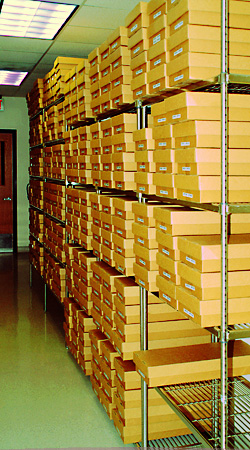Home | Glossary | Resources | Help | Contact Us | Course Map
Aviso de archivo
Esta es una página de archivo que ya no se actualiza. Puede contener información desactualizada y es posible que los enlaces ya no funcionen como se pretendía originalmente.
Evidence Storage Conditions
Storing biological evidence under proper conditions is an important aspect that must be addressed in evidence retention policies. Evidence can be stored in a number of different locations, including a courthouse, at the investigative agency, at the forensic laboratory facility, or in other off-site locations. Establishing evidence storage procedures helps maintain integrity and facilitates the retrieval of evidence for investigative and judicial proceedings.
It is crucial that dried biological evidence be stored in a humidity-controlled storage area. Thoroughly dried biological evidence can be stored at room temperature or frozen, depending on the agency's storage facilities. Failure to establish appropriate evidence storage policies can render biological samples useless for DNA analysis and may result in the inability to locate critical evidence.12
12 Optimal storage conditions for highly dilute DNA samples: A role for Trehalose as a preserving agent S. Smith, P.A. Morin, Journal of Forensic Sciences, Volume 50, Issue 5, September 2005, pp 1–8 PDF download: 172kB
Additional Online Courses
- What Every First Responding Officer Should Know About DNA Evidence
- Collecting DNA Evidence at Property Crime Scenes
- DNA – A Prosecutor’s Practice Notebook
- Crime Scene and DNA Basics
- Laboratory Safety Programs
- DNA Amplification
- Population Genetics and Statistics
- Non-STR DNA Markers: SNPs, Y-STRs, LCN and mtDNA
- Firearms Examiner Training
- Forensic DNA Education for Law Enforcement Decisionmakers
- What Every Investigator and Evidence Technician Should Know About DNA Evidence
- Principles of Forensic DNA for Officers of the Court
- Law 101: Legal Guide for the Forensic Expert
- Laboratory Orientation and Testing of Body Fluids and Tissues
- DNA Extraction and Quantitation
- STR Data Analysis and Interpretation
- Communication Skills, Report Writing, and Courtroom Testimony
- Español for Law Enforcement
- Amplified DNA Product Separation for Forensic Analysts


